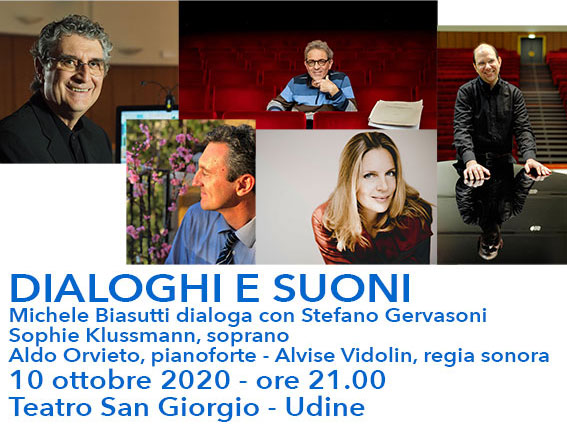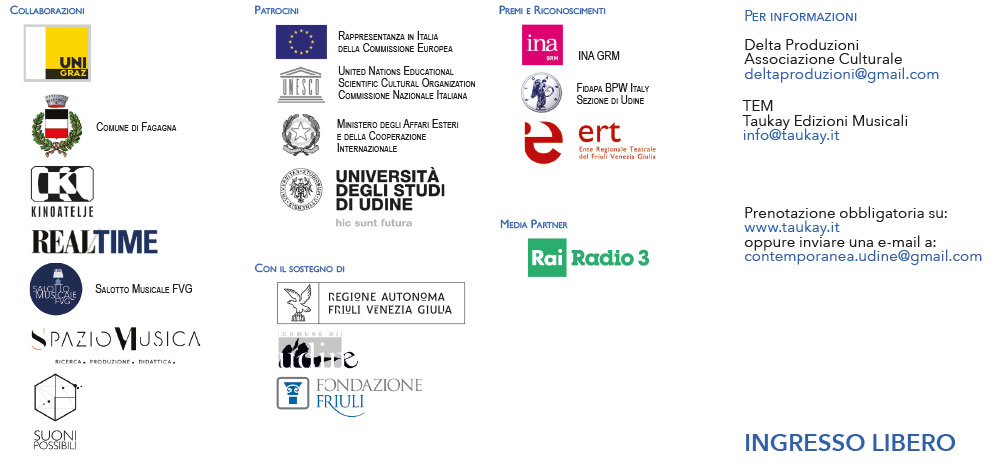 |
|
|
With a voice that is warm, wide-ranging and dark-hued, and commanding a repertoire that extends from the baroque to the present day, German-born soprano Sophie Klussmann is in demand as a concert singer, as a recitalist and on the opera stage. In recent seasons her engagements have included a world tour of Mozart concert arias with Martin Haselböck and the Wiener Akademie, and performances and recordings of 20th century music with the Berlin’s Scharoun Ensemble, the pianist Oliver Triendl and a variety of other partners. Over her career to date she has collaborated with such conductors as Vladimir Jurowski, Marek Janowski, Ingo Metzmacher, Helmuth Rilling, Marcus Bosch, Michael Gielen, Michael Sanderling, Karl Heinz Steffens and, in the field of historically informed performance, Marcus Creed, Václav Luks and Attilio Cremonesi. Her career has taken her to such venues as the Berlin Philharmonie, Vienna Musikverein, Zurich Tonhalle, Amsterdam Muziekgebouw, Théâtre du Châtelet in Paris, New York City Center and the Concert Hall of the National Grand Theatre Beijing and HongKong. Sophie Klussmann numbers Thomas Quasthoff, Dunja Vejzovic, Margreet Honig and Klesie Kelly-Moog among her mentors. From 2009 to 2011 she was a member of the Halle Opera, singing a variety of soprano role, and in Halle and at the Komische Oper Berlin she gave the world premieres of two operas by the composer Christian Jost. In 2013, at the Baden-Baden Easter Festival, she covered Anna Netrebko in the role of Donna Anna, while 2016 brought her debut as Micaëla (Carmen) in Wuhan, China. She also enjoyed a long-term international collaboration with American actor John Malkovich on the theatre pieces The Giacomo Variations and The Infernal Comedy. In 2019, she debuted as Rosalinde (Fledermaus) at the opening production of the Bad Hall Festival Austria. Sophie Klussmann is a keen interpreter of song and chamber repertoire and in 2015 her first solo CD was released on the Capriccio label. She is a regular guest at Chamber Music Festivals such as Kuhmo Finland, Kempten Germany, Rheingau Germany and sang in 2019 at Musikfest Berlin.
Aldo Orvieto studied at the Venice Conservatory. He owes much of his musical development to Aldo Ciccolini. Lorenzo Arruga has written of him: “Rare case of pianist who, as he plays, looks inside the music”. He has recorded productions and concerts for the main European radio broadcasters, among them: BBC, RAI, Radio France; the main German Radio broadcasters (WDR, SDR, SR), Belgian Radio (RTBF), the Radio of Italian (RTSI) and German (DRS) Switzerland and Swedish Radio. He has recorded more than fifty CDs dedicated to Composers of the classical era of the Twentieth Century for Dynamic, Stradivarius, Ricordi, Nuova Fonit Cetra; ASV and Black Box Music (London), Cpo (Georgsmarienhütte), Mode Records (New York), Hommage (Hamburg), Naxos (Hong Kong), always to the unanimous praise of the critics. He has played as soloist with many orchestras, among which Orchestra Sinfonica Nazionale della Rai di Torino, Orchestra del Teatro La Fenice di Venezia, Orchestra dell’Arena di Verona, Orchestra del Teatro Comunale di Bologna, ORT Florence, Ensemble 2e2m of Paris, Accroche Note of Strasbourg, Padova Chamber Orchestra and prestigious chamber ensembles. He has worked intensively in concerts and recording with the violinists Luigi Alberto Bianchi, Felix Ayo, Dora Bratchkova and Rodolfo Bonucci, with the cellists Arturo Bonucci and Luigi Piovano, with the pianists John Tilbury and Marco Rapetti and with the singers Sara Mingardo, Monica Bacelli, Gemma Bertagnolli, Luisa Castellani. In 1979 he was one of the founders of the Ex Novo Ensemble. He has taken part in many world premieres (in particular of works by Maderna, Togni, Clementi, Sciarrino, Ambrosini, Gervasoni, Francesconi, Corghi, De Pablo, Nieder) and received flattering praise from some of the greatest composers of our time (Nono, Petrassi, Kagel, Bussotti). He has been constantly present in the most important modern and contemporary music Festivals, among which: Biennale di Venezia, Milano Musica, Münchener Philarmoniker, Berliner Festspiele, Akademie der Künste (Berlin), Mozarteum Salzburg, Gulbenkian (Lisbon), Concerts Ville de Genève, Festival d’Avignon, Ars Musica Bruxelles, Festival de Strasbourg, Warsaw Autumn, Zagreb Biennale, Gaudeamus Foundation (Amsterdam), Tish Center for the Arts (New York), Huddersfield Contemporary Music Festival. Appreciation for Aldo Orvieto: “Berio came to Huddersfield several times, but surely this posthumous appearance was his finest... As for the piano Sequenza, I’ll never forget the way the pianist Aldo Orvieto screwed up his eyes and peered into the thick black ink of a score into which this darling of the avant-garde had deliberately written too many notes. Orvieto’s mastery of his instrument was awesome.”(Matthew Connolly Times., 02/12/2003). “So the louder passages have a thrilling, explosive quality, and Orvieto does a superb job of voicing his chords to bring out the piquant harmonies” (Joseph Magil, American Record Guide, Jan-Feb, 2004). “I particularly liked the way pianist Aldo Orvieto discovers a post-Schoenbergian expressionism in what is often played as a dense ticket of multiple tonalities.”(Tony Haywood, Classic CD Reviews, 2006) “Aldo Orvieto’s accompaniments are very string, communicating the wide range of colors and emotions covered in this music” (Henry Fogel, Fanfare May/June 2011)
Alvise Vidolin (1949) was born in Padova where he carried out scientific and musical studies. He is co-founder and member of Centro di Sonologia Computazionale (CSC - University of Padova), teaching Computer Music at the Department of Electronic and Computer Science, where he is conducting a research in computer assisted composition and performance. Co-founder of the Italian computer music association (AIMI), he was president in the years 1988-90, and now is member of board of directors. Since 1977 he has often worked for La Biennale di Venezia, promoting the computer music by congress (ICMC 1982), workshops, commission of musical works, concerts and exhibitions. Between 1992-1998 he worked as director of the musical production at the Centro Tempo Reale in Florence. He is member of the scientific committee of Luigi Nono Archive.
Born in Bergamo in 1962, Stefano Gervasoni began studying composition in 1980 on the advice of Luigi Nono: this encounter, as well as others with Brian Ferneyhough, Peter Eötvös and Helmut Lachenmann, turned out to be decisive for his career. After attending the Giuseppe Verdi Conservatory in Milan, where he studied with Luca Lombardi, Niccolò Castiglioni and Azio Corghi, Stefano Gervasoni met György Ligeti in Hungary in 1990, and then, in 1992, he attended the IRCAM Course in Composition and in Computer Music in Paris. The first three years in France launched Gervasoni's international career that eventually led him to be artist-in-residence at Villa Medici in Rome for the biennium1995-1996.
Michele Biasutti - Composer and Psychologist, he was awarded diplomas at the Padova Conservatory of music. A prize-winning composer (International Composer Competition L. Russolo, International Competition of Bourges, Concour International de Composition de la Societé de Musique Contemporaine du Québec, International Competition Pierre Schaeffer, ...), his works were radio broadcast (RAI, ORF, RNE 2, Radio
Programma: Stefano Gervasoni (1962) Altra voce, Omaggio a Robert Schumann (2015-17), per pianoforte e dispositivo elettronico trasparente (Produzione SaMPL, Padova) I. Luce ignota della sera, da Zwölf Vierhändige Klavierstücke für kleine und große Kinder op. 85 n. 12 II. Sirenenstimme, da Fantasiestücke op. 88 n. 3 III. Fiori soli rossi, da Waldszenen op. 82 n. 3 e 4 IV. Vogelgänger, da Waldszenen op. 82 n. 7 V. Alba mentore, da Gesänge der Frühe op. 133 n. 1
Sechs Grabschriften (2017-19) su epitaffi di Nelly Sachs, per voce e pianoforte I. Der Ruhelose [K.F.] a Luigi Pestalozza, in memoriam II. Sie, die ihrem Kinde das Grab grub [M.A.] III. Die Malerin [M.Z.] a Mariuccia Rognoni, in memoriam IV. Die Marionettenspieler [K.G.] à Alain Bioteau, in memoriam V. Die Schauspielerin [E.L.] ad Anna Maria Morazzoni, in memoriam VI. Die Besiegte [W.B.] a Ernst Bloch, in memoriam (con speranza) [Die Besiegte: versione con elettronica] |
|
 |
|


